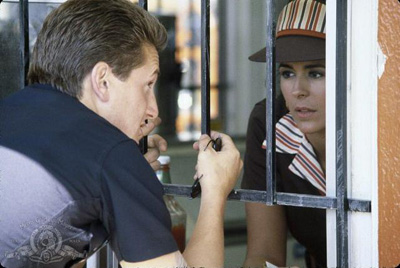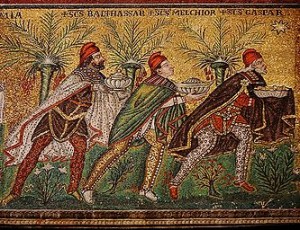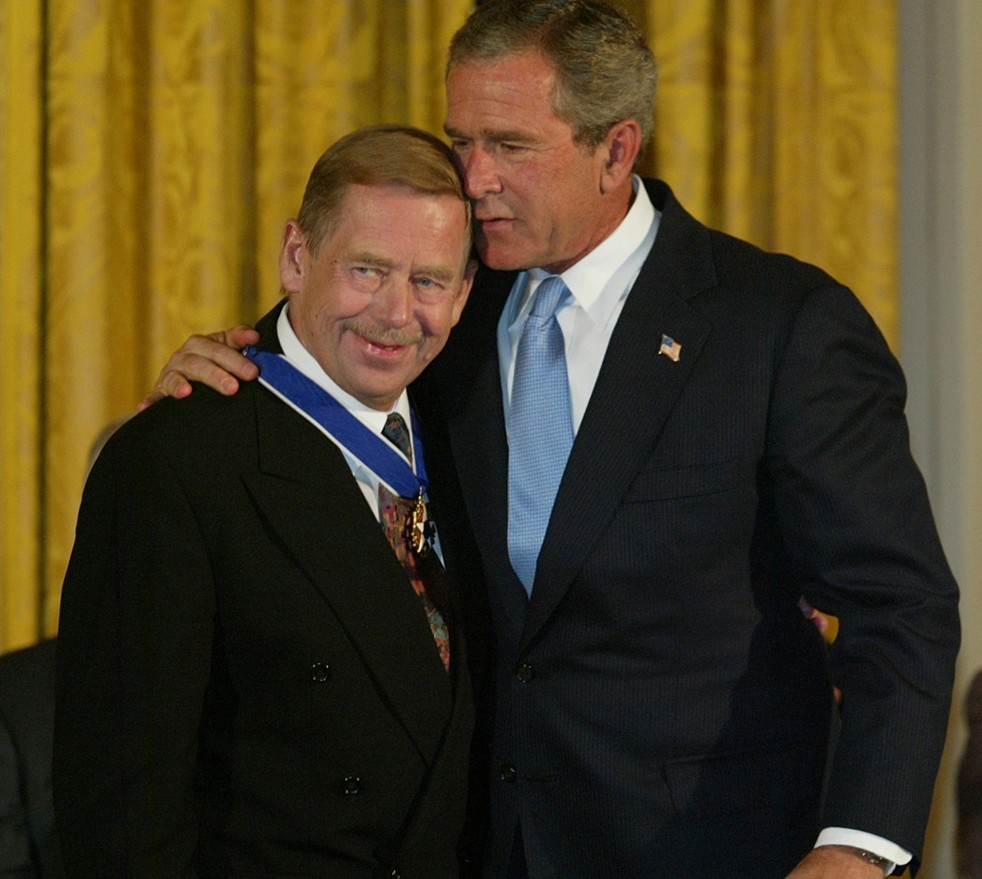I once read a tidbit about the 1968 uprising against Soviet control in Czechoslovakia that I’ll always remember. As the tanks rolled through the streets crushing the revolt, citizen protesters tore down street signs and burned local maps to prevent the Soviets from finding a free radio station. It had been hastily erected to broadcast free ideas out to the Czech people. The tactic worked for several hours — the tank drivers hadn’t a clue how to get around Prague — but the station was eventually located and destroyed.
I’ve always wondered what it was like for those protesters, knowing they did not stand a chance against the Communists, but fighting ’til the end anyway to pump a few last musical notes of liberty into the air.
Vaclav Havel was part of that uprising. A big part. His writings helped inspire it, and he was was jailed four times for them.
Twenty-one years later, with the radio stations firmly in government hands, the sound in the air was of keys. The protesters jingled them everywhere to say “your time is up, we’re in charge of our own doors now.” And without a shot fired, the regime collapsed on the weight of its failure. Mr. Havel, a poet and playwright, became the Czech Republic’s first president.
Below is a New York Times story from the day the Soviet-puppet regime fell. It may never have been written — or it may have been written very differently — if there was no Vaclav Havel. RIP.
PRAGUE, Nov. 28— It seemed somehow appropriate that when the old regime in Czechoslovakia formally agreed to cede its monopoly on power, the deed was done between a caretaker Prime Minister and an opposition lacking even a formal headquarters.
So dizzyingly swift was the downfall of Milos Jakes and his associates in the Communist leadership that when Prime Minister Ladislav Adamec met today with Vaclav Havel and the other opposition leaders of the Civic Forum, the participants seemed to be sweeping away some unpleasant remnants before plunging into the next and far more complex phase in the shaping of a post-Communist Czechoslovakia.
As a Civic Forum representative told a news conference today, ”The meeting of the demands today is just a recognition of the de facto situation on the part of the Government.” The Nuts and Bolts Remain
To be sure, much remained to be resolved and prepared. Mr. Adamec’s pledge to delete the ”leading role” of the Communist Party from the Constitution still left the Communist apparatus very much in place, running the factories, schools, courts and Government bureaus. There were still free elections to secure, ministries to fill, economic plans to forge.
But the vast force of humanity so strikingly mobilized over a week and a half of demonstrations and yesterday’s two-hour general strike – a power manifest in the red, white and blue ribbons worn by every second Czechoslovak, in the flags decorating every house, in the myriad notices plastered to the shop windows of Prague and in the jubilant air pervading the old capital – seemed to preclude any chance of a comeback by the old guard.
Twenty-one years earlier, it required Soviet tanks to stifle the Prague Spring reform period. Now the Kremlin seemed almost irrelevant, Russians totally absent from the demonstrations or the slogans except for the rare tribute to Mikhail S. Gorbachev. And without Moscow, the old guard had proven to be only a flimsy facade. Learning by Example
Just as the Czechoslovaks followed their neighbors in the march to freedom, so too did they copy them in savoring their moment of triumph. Like the East Germans dancing through the newly opened Berlin wall, or the Hungarians cheering the restoration of the republic, Czechoslovaks also found themselves at that euphoric moment in their revolution before the heady wine of freedom began to exact its inevitable price.
The glow was almost tangible in the streets. People seemed unusually polite, even affectionate toward one another. At an impromptu public discussion in the small Ypsilon studio theater, an actor drew laughs when he said he saw a tram grind to a halt and come back in reverse to pick up a tardy passenger.
Students went around to shops with razor blades and sponges to rub off dated notices from among the hundreds plastered in virtually every shop window. Others posted large signs urging people not to spray-paint slogans onto walls.
”Democracy is fine,” said 21-year-old Pavel Strida as he looked at the word ”democracy” sprayed onto a stucco wall, ”but it’s the people who will have to clean and repaint the walls.”
The Czechoslovak colors seemed to be everywhere, demonstrating a welling up of national pride. The symbol for the Civic Forum, the umbrella group of the opposition, included a leaf from the national tree – the lime in its design.
”Before this, I was afraid of what would come next, afraid that we would become poor like the Poles,” Mr. Strida said. ”Our professor told us recently that our country was turning into a memorial display of Communism. But now we have taken our own way.” A First Step
At any rate, they had taken the first step along the way, shedding the yoke of a system that had dragged Czechoslovakia from the front ranks of industrialized Europe to the sidelines.
But already now, even while the Civic Forum searched for a headquarters and Mr. Adamec looked for new ministers, the faint outlines of the future were taking shape – pointing, many here thought, to a pluralistic social democracy and a market-oriented economy.
A central role in the future seemed likely for Walter Kamarek, the director of the Economic Forecasting Institute, who had argued for years that Czechoslovakia needed to inject market forces and to accept democratic pluralism if it was to reform its economy.
Another economist, Vladimir Karlez of the Academy of Sciences, was reported preparing a plan for the opening of the economy to domestic entrepreneurs and foreign investors. Relatively Fortunate Land
How Czechoslovakia would fare in a post-Communist order was, at this stage, impossible to predict. But in comparison with Poland, Hungary and East Germany, at least, it seemed reasonably well positioned.
Czechoslovakia could not boast of East Germany’s special links to a prosperous Western patron. But that also safeguarded it from the rush for West German marks and goods that has seized the East Germans since the border between the two Germanys fell open.
A well-developed industrial base, even one allowed to grow decrepit under 40 years of Communist mismanagement, still afforded the Czechoslovaks a disciplined labor force and a base to build on.
With the population at a manageable 15 million and a foreign debt nowhere near the level of Hungary’s or Poland’s, Czechoslovakia seemed free of imminent economic crisis.
And a rich cultural tradition, coupled with a lingering faith in socialism, seemed to preclude any major social problems – at least in the immediate future. Improvisational Quality
The very swiftness of its revolution seemed to be in Czechoslovakia’s favor. Though the bloodshed during the police attacks on Nov. 17 still hung heavy in the public memory, the subsequent pace of events gave these days an improvisational character that seemed to sustain idealism and a party-like atmosphere.
There was not the fatigue of Poland’s long series of strikes, nor the demoralizing exodus of East Germany. Rather, there was still energy to burn and the glow on the horizon was still bright.
By one of those lovely quirks so prevalent in these heady days, Civic Forum was given the Magic Lantern experimental theater for its temporary headquarters. For their evening news conferences, leaders of the opposition sat before a newly built set representing the last tunnel of the Minotaur – a maze guarded by a mythical creature with the head of a bull and the body of a man – with the light at the end of it glowing behind.
They had not planned it that way, nor had the theater, nor had Czechoslovakia. But in the spirit of the moment, improvisation and destiny seemed to blend in wondrous ways.






